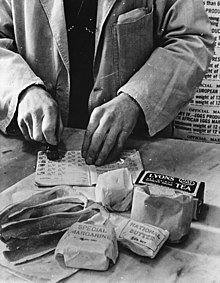This article has multiple issues. Please help improve it or discuss these issues on the talk page. (Learn how and when to remove these messages)
|

Rationing was introduced temporarily by the British government several times during the 20th century, during and immediately after a war.[1][2]
At the start of the Second World War in 1939, the United Kingdom was importing 20 million long tons of food per year, including about 70% of its cheese and sugar, almost 80% of fruit and about 70% of cereals and fats. The UK also imported more than half of its meat and relied on imported feed to support its domestic meat production. The civilian population of the country was about 50 million.[3] It was one of the principal strategies of the Germans in the Battle of the Atlantic to attack shipping bound for Britain, restricting British industry and potentially starving the nation into submission.
To deal with sometimes extreme shortages, the Ministry of Food instituted a system of rationing. To buy most rationed items, each person had to register at chosen shops and was provided with a ration book containing coupons. The shopkeeper was provided with enough food for registered customers. Purchasers had to present ration books when shopping so that the coupon or coupons could be cancelled as these pertained to rationed items. Rationed items had to be purchased and paid for as usual, although their price was strictly controlled by the government and many essential foodstuffs were subsidised; rationing restricted what items and what amount could be purchased as well as what they would cost. Items that were not rationed could be scarce. Prices of some unrationed items were also controlled; prices for many items not controlled were unaffordably high for most people.
During the Second World War rationing—not restricted to food—was part of a strategy including controlled prices, subsidies and government-enforced standards, with the goals of managing scarcity and prioritising the armed forces and essential services, and trying to make available to everyone an adequate and affordable supply of goods of acceptable quality.
- ^ Zweiniger-Bargielowska, Ina (2002), Austerity in Britain: Rationing, Controls and Consumption, 1939–1955, Oxford University Press, ISBN 978-0-19-925102-5
- ^ Kynaston, David (2007), Austerity Britain, 1945–1951, Bloomsbury, ISBN 978-0-7475-7985-4
- ^ Macrory, Ian (2010). Annual Abstract of Statistics (PDF) (2010 ed.). Office for National Statistics. p. 29. Archived (PDF) from the original on 7 October 2012. Retrieved 3 June 2021.